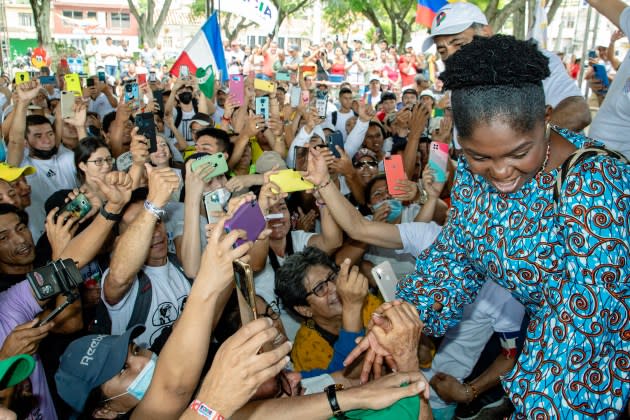‘Igualada’ Review: A Hagiographic Portrait of a History-Making Colombian Political Candidate

In the biographical documentary “Igualada,” the space between the presidential candidate Francia Márquez and the underrepresented Colombians she inspires is often electric with hope, yearning and recognition. Her 2021 campaign and movement motto, reflective of her African roots — “I Am Because We Are” — struck a chord with its deep humility and humanity. The image of a Black woman in a crowd listening raptly, her eyes brimming, comes as confirmation. But the activist turned presidential hopeful inspired anger. When she takes to a podium during a campaign stop, she stands behind the bulletproof shields of a police detail. The gathered can barely see her as she addresses them.
Director Juan Mejia Botero’s documentary, which debuted at the Sundance Film Festival, is rousing and intimate, making for an often moving, sometimes nerve-wracking ride. It’s those very qualities that also nudge occasional moments of very gentle skepticism: Is this really what the candidate is like? That’s a reasonable reaction for American audiences, since this nagging doubt may be the product of years spent watching the making and selling of presidents in the U.S.
More from Variety
'As We Speak' Review: Kemba Examines When Artistic Expression Is Wielded as Evidence
'Malu' Review: Superbly Acted Brazilian Drama Traces Tumultuous Mother-Daughter Relationships
'10 Lives' Review: A Cat Comes Back in Different Forms in Kiddie-Targeted Kitty Toon
Botero has known his subject for more than a decade, and the film is a beneficiary of that knowledge. “I love to drift off to the sound of the river,” the thoughtful young woman with the attentive eyes and bright smile says in an early clip from 2009.
The Cauca region in Colombia’s Pacific Southwest, where La Toma sits, is home to more than a quarter-million descendants of enslaved Africans. It is also resource rich. Over the decades, gold has made it a target of transnational companies; and paramilitary groups have intimidated, displaced and killed residents. It was at a funeral of five murdered sugarcane workers in 2020 that Márquez decides to launch her seemingly quixotic plan for the presidency.
What began as a way of demanding that attention be paid to the dangerous, corrupt and economically exploited conditions of Afro-Colombian, rural and indigenous people builds energy in the run-up to the 2022 elections.
“Igualada” follows Márquez’s tenacious saga, which Botero captures with up-close-and-personal access. Even a viewer suspicious of the film’s more adulatory gestures will gain a deeper insight into the nation’s politics and its multiracial population through scenes of marginalized Colombians stirred into engagement, as well as the reactions of those in power outraged by Márquez’s run.
The word “Igualada” is so specific in its bigotry that one might marvel. An opening intertitle provides a definition: “A derogatory term (based on class, race and gender) used to designate someone who acts as if they deserve rights and privileges that supposedly don’t correspond to them.” It will be hurled as an epithet but also transformed by Márquez into a signifier of connection.
To build on her grassroots support, Márquez will also have to balance her authenticity with her tactical skills. The director shares enough of Colombia’s history of civil war, paramilitary violence and politics to ground the film, though a quick search-engine refresher on Colombia’s bitter and lethal politics on the viewer’s part wouldn’t hurt and can add to her appreciation of what Márquez achieves.
“Igualada” follows the candidate and her campaign team as they draw the underrepresented into action. Márquez works with other left-leaning parties (sometime uneasily) as she pushes against the establishment in Colombia’s changing political scene. In 2021, a broad coalition of left-leaning political parties forged the Historic Pact. That pact and former guerilla fighter and senator Gustavo Petro figure significantly here. Also vital to the story are Leonardo González and Lilianna Mojica, her go-to campaign leads on the ground.
As a community activist fighting for land rights, Márquez was already accustomed to being a target. Her early courage proves an asset as she embarks on her presidential bid. During a video meeting with a security expert to discuss risk, she gently balks at the suggestion that she avoid visiting her hometown where her mother, Doña Gloria, and two sons live. Even so, one of her sons will depart the country.
It feels churlish to question, however mildly, a film for presenting its appealing and deserving subject — clearly on the right side of history — so positively. But hasn’t history taught us that leaders of movements are never alone in their efforts? So, as affecting as “Igualada” is, as catalyzing a leader as Márquez proves to be, it’s the waves of energy and engagement the film captures around the candidate — the faces in the crowds, the campaign workers in the streets — that deeply beckon with the promise change.
Best of Variety
Sign up for Variety’s Newsletter. For the latest news, follow us on Facebook, Twitter, and Instagram.

